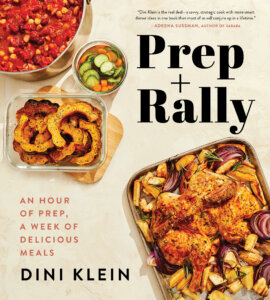Finally, a cooking strategy to cut hours off your meal prep time (even on Rosh Hashanah)
Dini Klein’s ‘Prep + Rally’ cookbook might not be a lifesaver, but it may very well be a significant timesaver

Graphic by Angelie Zaslavsky
Making my way through “Prep + Rally,” a new cookbook that delivers an impressive repertoire of creative, family-friendly meals — and a strategy for whipping them up in the most stress-free manner possible — I wished that Dini Klein had written it years ago. I sure could have used a guide like this when my now-grown kids were young and — like so many moms and dads — I was juggling work, parenthood and the desire to put well-balanced dinners on the table no matter how burned out I might feel.
Until fairly recently, the struggle was real for Klein, too. Having completed a two-month program at the Center for Kosher Culinary Arts, she was working as a private chef for two families while raising her own little daughters, who are now 6 and 8 years old.
“I would get home and I didn’t even want to look at food, but my family was starving,” she told me. “I had to get creative and figure out how to cook for my own family as well. We were eating cereal!”
Ultimately she figured out that if she placed one big grocery order a week, then spent an hour or so on Sunday prepping a few substantial basics — a roast chicken (or two) and vegetables, for example, along with another protein, a grain or two, and a variety of simple sauces and dressings, those staples could be transformed during the work week (that’s the “Rally” part) into any number of quick, imaginative dishes: tacos, salads, grain bowls, sandwiches, scrambles and more.
“I was saving a ton of time, a ton of money, and it was helping me get through the week stress-free,” Klein said. “My kids were eating healthy, and there was always something new that they were trying out. I thought, ‘If it could work for me, it will work for other people.’ ”
Thus, the “Prep + Rally” method was born. Klein created an online meal-prep subscription service that provided members with weekly shopping lists, menus, recipes and step-by-step instructions. She made live Instagram videos where she and her followers cooked the dishes together. (After a move to Los Angeles created a time-zone issue, she began prerecording and uploading the videos to YouTube.)
The book was the obvious next step. In it are 10 weekly, kosher meal plans with names like “Spiced and Stewed,” “One-Pan Heroes,” “Winter Cozies” and “No Way It’s Veg,” each with a shopping list. Each comes with a shopping list, a group of “Prep” recipes to cook in about an hour one day a week, and “Rally” recipes that make fast, often-inventive use of those basic elements.

There’s also a chapter called “Last Minute Scramble,” which contains clever ways to turn eggs into a satisfying last-minute meal. Another is called “Sweets, Snacks, and Everything in Between” — it includes a recipe called “Dang Good Breakfast Loaf” made with an autumnal mix of carrots, apple sauce and cinnamon — an obvious choice for the High Holidays.
Intrigued by the “Prep + Rally” method and menus — if skeptical that it would take only an hour to do the prep for some of them — I chose a meal plan called “Brekkie for Dinner,” and got to work.
In about an hour I was supposed to pull together roast chicken with root vegetables, a green vegetable “Hulk” soup, cornbread, beef picadillo, soy brussels sprouts, pickled vegetables, green goddess sauce and an egg mixture for the French toast I’d be rallying to produce later in the week with leftover cornbread.
I got all the ingredients and laid them out on trays — one for each of the “Prep” dishes — and set a stopwatch to see how long the whole process took.
I think I may have chosen a particularly ambitious menu, especially since the chicken was supposed to be spatchcocked, and I decided to spatchcock it myself. (To spatchcock is to cut out the backbone of the chicken — i.e., to butterfly it — so that it lies flat on the roasting pan and therefore cooks more quickly than a regular whole chicken. I’ve done it many times before, but it still took eight minutes out of my precious hour.)
So how did it go?
At the end of about an hour and a quarter I had a perfectly cooked, deliciously well-seasoned roast chicken and vegetables, a vibrant lemon-and-dill-enhanced vegetable soup, a flavorful caper-and-olive-studded picadillo that I made with plant-based meat instead of beef, a lovely cornbread, and a dairy-free green-goddess dressing that I want to slather on everything from now on.
I ran out of steam before getting to the Brussels sprouts, but they were easy enough to do during the week, as was the egg mixture for the French toast. I already had homemade pickles in my fridge, so I skipped that recipe too.
There were a lot of pots and pans, and a lot of food to be stored in the refrigerator. I wished I had more counter space and a bigger oven and fridge, but if I were still cooking regularly for a family of four, I probably would.
I’d wondered if the directive to make everything in an hour would result in food that skimped on flavor, but everything tasted fantastic. Would I choose to cook my onions and garlic on lower heat next time, to avoid the burned garlic? Yes. And I would definitely ask the butcher to spatchcock that chicken.
Even if the Prep recipes might take the average cook closer to an hour and a half to pull together on a Sunday, it is so delightful to have all that stuff in the fridge, ready for a week’s worth of dinners. Chicken with root vegetables with a side of the Hulk soup was satisfying and cozy, and the chicken was great a couple of days later repurposed into green goddess wedge-chicken salad.
The “beef” picadillo was terrific with the cornbread (the only thing I had to do that night was roast those soy Brussels sprouts), and cornbread French toast with eggs and pickled vegetables was a fun and satisfying breakfast-for-dinner meal.
The leftover chicken could also be repurposed into several other “Rally” recipes in the book: chicken-broccoli egg rolls, Mexican-inspired chicken flautas, frilled chicken pita pockets, California chicken salad, or “Easy-Peasy” chicken and rice.
And while not every dish comes across as entirely “kid-friendly,” every menu is adaptable.
“I always vouch for one meal for the whole family, with small modifications to make it work for everyone,” Klein said. “And DIY-style dinners — that’s a really great way to do that. You’re deciding ‘these are the taco toppings,’ but you get to choose how you want to eat it. The kids think that they’re calling the shots, but you’ve dictated what’s for dinner, and they get to choose how they get to enjoy it. They’re making these decisions but they’re eating your dinner.”
Getting kids involved in the prep or the assembly is a great way to build confident and happy eaters, she added.
And for readers who may lack confidence in the kitchen, Klein offered this approach: “The first time you do it, it may seem a little intimidating and scary, so you can make two things rather than all of them. There are no rules. Our job is to keep tiny humans alive and get through life and do the best we can.”
The goal, she added, is to get through the week as easily as possible. “So make those modifications, make it work for you, and have fun in the process.”
















